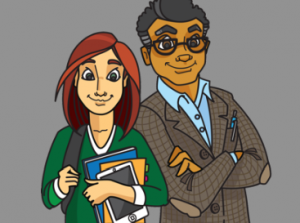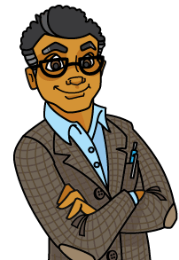My relatives used to say recitation was important to practice for an English degree because I would need to recite “Would you like fries with that?” over and over after graduating. When I graduated from Berkeley in 2008, during the Great Recession, I realized my family was not kidding. While I eventually obtained a good job working as a Technical Writer, my experience on the job market was daunting. Early college students now studying several years after the Great Recession have to weigh their employment potential early on. Cartoon characters Libby and Art are now defending the humanities on Twitter @SmartColleges against complaints that humanities degrees do not offer stable employment. “Libby” is an auburn-haired student who juggles several books and a backpack slung to one shoulder and Art is a college counselor who wears framed glasses and a tweed jacket with elbow patches. I caught up with them to talk about the value of carrying all those books, the crisis in the humanities, and what college students should know about humanities education today.
Hi Libby and Art! You’ve published nearly 2,000 tweets to support a liberal arts education. What inspired this project?
Libby: Well, I sort of freaked when I started looking at colleges and was deciding where to apply. There’s soooooo much conflicting information telling students what to major in, what kind of college to go to—and even whether to go to college at all. I clocked hours googling and surfing about the liberal arts, and OMG! There was so much negativity—I didn’t know what to believe…or where to get solid info.
Art: That’s where we come in. Students are getting a lot of mis-information as well as information. Some myths keep resurfacing, like liberal arts graduates being unable to find a job except serving fast food. That just isn’t true. Liberal arts graduates are doing great things. We can help students and their parents make informed decisions by letting them know important facts and data—along with the personal stories of successful liberal arts grads.
What do you love most about the humanities?
Libby: They’re epic! To start, “humanities” is about humans, right? All my humanities courses—history, religion, literature, philosophy, and others—help me understand people better—both myself and others. The sciences are also important—they teach me the “what” and the “how” of the world, but the humanities help me think about “why.”
The humanities are great. But what about the looming job market that everyone seems to be talking about? Libby, what can students do to prepare for a fulfilling career?
Libby: Yeah…my besties and I talk about that all the time. I don’t know what I would have done without Art’s advice. Srsly! He’s helped me realize that studying the areas that I love—reading, writing, and communicating—is also great preparation for a successful career.
Sure, it’s awesome to do well in my classes, but I’m also prepping for the job market in other ways. I had a sweet internship this past summer with an online magazine. Next summer I’m definitely going to do another internship—maybe work for a publisher or as a writer for a tech start-up. As Art has told me, these experiences will make me more “marketable” when I hit the job market.
Right now I’m managing social media for the student newspaper, and I’m learning different computer apps that I’ll need for my first job—desktop publishing programs, social media apps, that kind of thing.
Tell me about your favorite books.
Libby: I’ll tell you a weird one (I would NEVER have believed I’d like this). I took a course about Moby Dick with an amazing professor, and now I love Moby Dick! You think I had any interest in whaling? Umm, no. But the professor was so excited about it, and it was so inspiring. He showed us how this book is about, well—everything! Who would have thought? Good and evil, how language works, the history of technology, different religions, race in America, choosing values for your life. It’s awesome how studying the humanities can be totally surprising—and eye-opening!
Art, how do you counsel students about humanities degrees?
Art: Of course, it’s different for each student. But, in general, Libby’s activities are a great guide for other liberal arts and humanities majors. Get involved in your classes and enjoy them. These experiences will enrich you as a person; they can help you become an informed citizen with a well-rounded perspective on the world, as well as successful in your chosen career.
In fact, on the career side, it never hurts to start doing some research in your freshman year about different areas that interest you, including checking online resources and meeting with people in different lines of work. This will give you insight into what different jobs are really like and how you can begin preparing right now.
Then, as Libby has done, it’s important to get some work experience. You’ll find out what you do—and don’t—like and what you’re best at. You can scope out the job market and understand what you will need to do to land that first position.
Libby and Art, some of the complaints about humanities-related careers are not that humanities students aren’t finding jobs but that the jobs are often times unfulfilling. What do you think about underemployment issues and unfulfilling careers?
Art: You make a good point. Employment and job fulfillment can be two quite different things. No matter what your college major, you may find an entry-level job pretty limiting and not what you expected.
Libby: Yeah, employers often want to see how you can handle the boring stuff first—and they want to know they can trust you before handing out bigger assignments.
Art: Well, Libby, the “boring stuff” is part of everyone’s job. So do the work—but show your employers what else you can do, even if that means spending your own time on work that is outside your job description. After all, as a liberal arts or humanities graduate, you’ve got an advantage: You can think critically and creatively. You can adapt quickly to many different circumstances. Once you show how you can contribute to your workplace and your team, your employer will begin to give you greater responsibility, and you’ll have a chance to gain respect, advancement—and job satisfaction.
Tell me about some of the rad people that you’ve talked with while embarking on your humanities advocacy journey.
Art: “Rad” people?
Libby: Okay, Art—I’ll translate! It’s been pretty amazing discovering how many different people love the humanities! Liberal arts graduates include athletes, politicians, astronauts, wine makers, corporate execs, and fashionistas – along with Nobel Prize winners in science, military leaders, heads of tech companies, and TV pundits. We’ve found so many talented people who are really passionate about how important the humanities are! You can read some testimonials here (http://www.liberalartspower.org/lowdown/who) and see for yourself all the different things people can do with a liberal art degree—so many possibilities!
Many times you post facts, such as “FACT: Average debt for bachelor’s degree recipients at independent colleges and universities is $19,500—less than the price of a modest car.” But what about students who have to take on more than the average level of debt for a humanities degree. How much debt is too much debt for a liberal arts degree?
Art: There’s really not one single answer to this question, because no two students are the same. Students should view college loan debt as an investment in their futures, and ask themselves, “What kind of future do I want? What are my long-term career goals? Do I want to go to graduate school, or enter the workforce after I earn my college degree?” The answers to these questions will help determine how much debt is reasonable for a particular student.
Remember, too, that students at private liberal arts colleges are much more likely to graduate in four years than those at other colleges, and twice as likely to receive grants. You can get a first-class education without paying a top-shelf price. Students can figure out their personal goals and what makes financial sense given their situation, then choose from a wide range of institutions, settings, and locations to find the perfect fit.
Art, what do you say to parents who are scared that their students won’t find jobs after graduating?
Art: I know that parents want the best future for their children. The recent recession has led many parents to worry about whether their children will find employment after graduating. However, don’t believe the scary stories that keep showing up in the media—they are misleading. Here are some facts:
The unemployment rate for college graduates—even during the recession—was half that of non-college-grads. In the case of liberal arts graduates, parents may be interested in these research findings:
1) Liberal arts graduates DO get jobs. Liberal arts colleges are tracking what happens to their seniors after graduation. In general, 85–90% of their graduates are employed (or continuing on to graduate degrees) six months after graduation.
2) Over time, many liberal arts graduates earn more than non-liberal arts grads. They may not start out with the highest salaries, but in their peak earning years, liberal arts grads surpass those with pre-professional degrees.
3) A disproportionate percentage of chief executive officers have liberal arts degrees. Even in fields like engineering, advancing to leadership requires the breadth, depth, and skills of a liberal arts degree.
I also urge parents and students to think beyond a paycheck. Liberal arts graduates have a wide range of interests; they are active and contributing members of their communities. They’re also lifelong learners and they know how to adapt to changing job markets and priorities.
Libby and Art, you’re just one part of a larger public-information campaign by the Council of Independent Colleges. Can you tell us about this larger campaign?
Libby: Sure thing! Er, Art, you start…
Art: My pleasure. The idea for this campaign stemmed from a meeting of the Board of Directors of the Council of Independent Colleges in 2012…
Libby: Boring! Art, let me tell the story—it’s an exciting campaign! We are the STARS of the campaign Twitter feed, @SmartColleges. But we’re also featured on the campaign’s Facebook page, (www.Facebook.com/SmartColleges) and on a brand new website (www.LiberalArtsPower.org) designed especially for students and parents. We even helped set up a YouTube channel for videos about the liberal arts (www.YouTube.com/LiberalArtsPower). Hmm…maybe we should do our own video, Art. We could be famous!
Art: I’m not sure I’m ready for that, Libby. But I do think that the important research being disseminated by the campaign—research that sheds new light on the issue of student debt and that demonstrates the outstanding success of smaller private colleges in producing graduates in STEM fields, for example—will, and already has, attracted significant media attention. And speaking of the media, we’re not only on social media. We also meet one-on-one with journalists around the country to share important myth-busting data. And we write opinion pieces and articles on campaign issues to reach the public more broadly.
Libby: Totally. We’re trying to get our information to as many students as we can, especially our alumni testimonials. They’re powerful because they show how liberal arts education has helped real people succeed in their careers. It’s what high school students want to know: What kind of job can I get with a liberal arts degree? Will it help me succeed in life? The testimonials bring those questions to life!
Art: Absolutely true, Libby. In fact, we make a point of including testimonials not only of famous alumni but also from alumni just a few years out of college and sharing their successes. Often high school students can identify more with them than with celebrities.
Libby: Yeah, like those working at Google or starting up their own tech company! I want to be an entrepreneur when I graduate…
What’s the future of Libby and Art Twitter posts? Where do you see yourselves in five years?
Art: As long as pernicious myths and misperceptions about the liberal arts and private colleges continue to circulate, we’ll be in the Twittersphere spreading the truth.
Libby: Dude, that makes us sound like superheroes—like we’re cartoon characters or something! If you ask me, Twitter may not even be around in five years—but I promise, Art, I’ll Defend the Liberal Arts always! And thanks to my liberal arts degree I’ll be prepared for the next Big Thing!
Art: “Dude?”
Libby: Captain Liberal Arts, then?
Art: Come to think of it, some colorful capes just might do the trick, Libby.
Thanks so much for talking with me! See you on Twitter.
Libby & Art: Thank you for talking with us—we enjoyed it!

All images used with permission.


It was easy for me to decide on studying English Literature. I always loved reading, stories and how they were crafted or not as the case may be.
I do think you should have to study at least one humanity and one maths/science subject to A Level though. I dropped Maths because it wasn’t relevant to my career goals but I missed it afterwards and once you’ve dropped it, there isn’t really a convenient way to pick it back up.